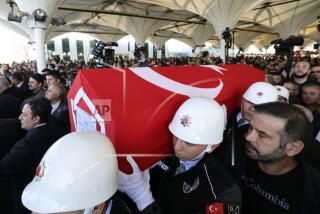Turkish Warplanes Blitz Kurdish Rebel Camp : Attack: Raid is biggest in 10-year-old uprising. Premier vows to bring group’s terrorism under control.
- Share via
ISTANBUL, Turkey — More than 50 Turkish F-16 and F-4 warplanes blitzed a Kurdish rebel camp deep inside Iraq on Friday with a barrage of 500-pound to 2,000-pound bombs, the Turkish armed forces said.
The raid was the biggest in Turkey’s 10-year-old struggle with the Kurdistan Workers Party (PKK), a Stalinist group whose aims include an independent state for the 20 million ethnic Kurds in the mountains straddling Turkey, Iran, Iraq and Syria.
“We will bring terrorism (Kurdish separatism) under control in 1994. This is a determined political decision,” declared Prime Minister Tansu Ciller, who monitored progress of the raid on big screens at Turkish military headquarters.
Armed Forces spokesman Col. Dogu Silahcioglu said he could not estimate casualties because the target area was covered to a height of 3,000 feet by a black pall of smoke from an exploding rebel ammunition dump. The Kurdish rebels insisted that the only dead were four Iraqi Kurds from a nearby village.
“We had expected such an attack and had taken precautions,” rebel spokesman Kani Yilmaz said.
Iraqi Kurdish spokesman Hoshyar Zibari said two Iranian Kurds, probably smugglers, were killed and two other civilians injured. At least nine badly wounded PKK guerrillas were taken to a hospital in a town several hours away by foot from the camp, he added.
Yilmaz alleged that Ankara had ordered the raid to cover up a crisis atmosphere in Turkey, where the national currency has fallen more than 20% and stock prices by more than half since Jan. 1.
“Such an attack is a demonstration of the dead end that the Turkish Republic is in,” he said.
The target camp, at Zaleh, lies 70 miles south of Turkey in an old smugglers’ valley tucked between mountains on the Iraqi-Iranian border. The guerrillas have used Zaleh as a main training and logistics base since American and Turkish pressure on Syria forced the closure of their big camp in Lebanon’s Syrian-controlled Bekaa Valley.
Briefing reporters, Turkish spokesmen showed a mock-up of the camp marking almost every tree and flimsy tent in the Zaleh base. The rocky, scrub-covered region is loosely under the rule of Iraqi Kurdish guerrillas, who are close to Turkey; they oppose Iraqi President Saddam Hussein and the Marxist ideology of the Turkish Kurdish rebels.
Turkish officers did not deny that one target of the raid was the camp commander, Osman Ocalan, the brother of PKK leader Abdullah Ocalan.
To hit the Zaleh camp, Turkish warplanes had to cross a “no-fly” zone patrolled by U.S. and allied warplanes to protect the Kurds of northern Iraq from Hussein. Turkey may also have counted on a recent improvement in relations with Tehran to conduct operations virtually on the Iranian border.
While NATO-member Turkey has garnered growing Western support in its fight against the PKK--which has not hesitated to use terrorist killings to show its power--some Western governments are frustrated at human rights violations by the Turkish security forces and Ankara’s refusal to enact reforms allowing freedom of expression.
For its part, Turkey feels its very existence is threatened. Armed forces generals said they were ready to renew the blitz, triggering speculation that the army may now be embarking on another of its regular offensives to wipe out the PKK. Preparations for an exceptional crackdown this year have included lengthening national service for conscripts among at least 150,000 troops serving in the southeast.
The number of guerrillas facing the security forces has also risen steadily over the years and was recently estimated at about 10,000 by the Turkish government. Nearly 4,000 people were killed in 1993, a record in the 10 years of conflict that have killed a total of 10,600 people.
More to Read
Sign up for Essential California
The most important California stories and recommendations in your inbox every morning.
You may occasionally receive promotional content from the Los Angeles Times.









